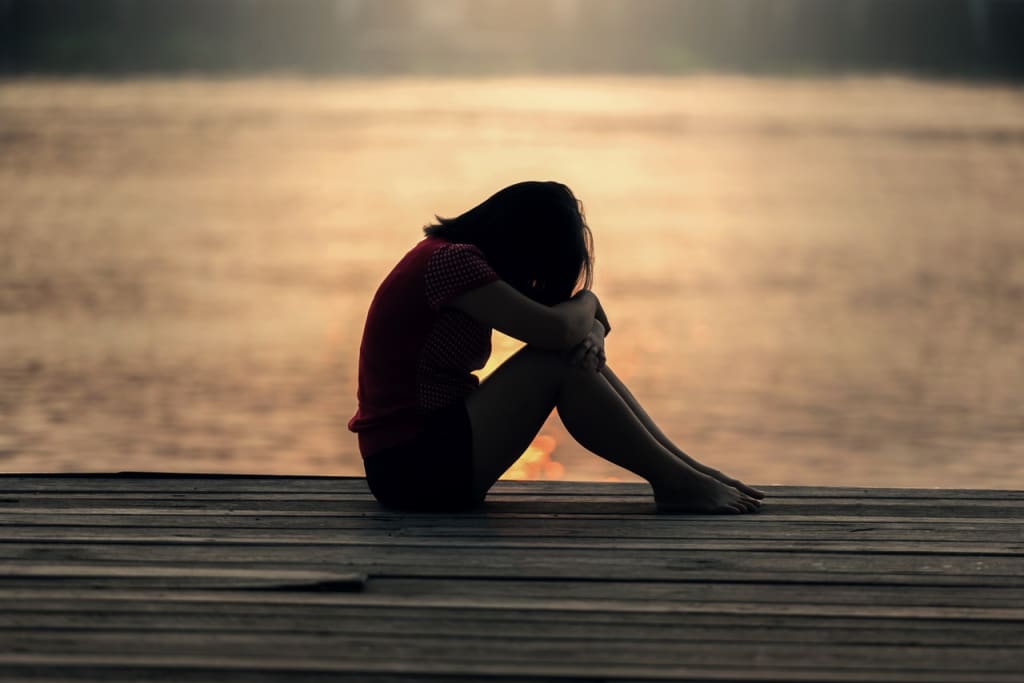
It's a fact–we all experience grief at some point in our lives. We never know when we might face it, or how it will come. And we definitely don't know how it will affect us.
I have seen death around me. It hasn't been particularly gruesome or traumatizing. One of my earliest memories was going to the funeral of one of my great-grandparents. I didn't know them well and I don't even know how old I was. But I have just one image of being there and seeing my grandma–their daughter–crying. And I could never forget it.
My paternal grandfather passed away before I was born. But I was always aware that that happened. His picture was around my and our grandma's houses. We often visited his gravesite and paid our respects as per the Chinese tradition. My mother even tells me this story about the time I "saw" and "played" with him on our day out to the theme park when I was young.
But when you're that young and that naive, do you truly understand what grief or even death is?
Intellectually, I thought I understood. There was a person there before, and now they were not. Perhaps they did get reincarnated as many Chinese believe, perhaps they did come back as ghosts, or perhaps they were even in Heaven. Growing up both Chinese and Catholic gave me many competing ideas of what happened to them.
But I was always immune, unfeeling. It was something I knew, not something that I felt.
And then my grandmother passed away. She'd been sick for a couple years, in and out of hospital. But in 2013, things took a turn for the worse. Just after my 19th birthday–that night in fact–she was admitted to hospital. It wasn't looking great. It was unspoken, and yet everyone knew, she was probably not going to make it back home anytime soon.
A little over a week later, we were called up in the middle of the night, and our entire extended family were called back to the hospital. It was time. I didn't really know what to expect. I'd watched enough Grey's Anatomy at the time that I thought I might be a bit more prepared. I thought the mellow tunes of some sad song might start playing like a soundtrack to this moment.
But it wasn't like that. We gathered around, we went up one by one, and said our goodbyes. We waited, made awkward small talk, stifling our yawns and didn't know what to expect. And then suddenly, it was done. She had passed.
I didn't know what to do or how to feel. I was numb. And this carried through until her funeral, to the weeks and months that came after. I noticed the way the people were around me. I never saw my family outwardly grieve. But then again, I wasn't finding it in myself. I felt bad. Friends were looking out for me, checking in, making me care packages, and yet I didn't know why I wasn't bursting into tears or feeling like my heart was ripped out.
Wasn't that what grief was? Was I that heartless, unfeeling that I didn't feel it?
I had stared death in the eye, leant my cheek against hers to say goodbye, and yet this did not affect me? I mean, in recent years, I wasn't exactly an emotional person. I cried SO much as a toddler, to the point that people I haven't seen in decades still talk about it. And yet, as I grew older, those tears and feelings seemed to get more and more repressed.
So maybe that's just how it was. Maybe this would be how I felt grief from here on in. I mean, there are surely worst things than being emotionally cutoff right?
But then it hit me, in full force, straight out of nowhere, with nowhere to hide.
I remember the day so well. I'd heard whispers that my uncle in Hong Kong was not well. He'd been keeping it a secret that he had actually been diagnosed with cancer months before. But things weren't getting better.
I think in this time of cancer awareness ribbons in every colour, and such positive stories about survival, I had almost forgotten that cancer was still such... well, a cancer. I forgot that it's still claimed that there are still over 45,000 people who die from cancer each year; that there is only a 69% chance of survival. And maybe I thought, it could never happen to me, that cancer was not going to touch me or my family. How foolish.
We realised that none of our extended family in Hong Kong knew of the situation either. We sat, helpless, in Sydney, texting our family members, getting them to get to the hospital, to make sure my grandma was there too. I called my sister to tell her to hurry home. My cousin came over to sit with us. I still had no inkling, no belief that this could happen.
We were getting short text updates as family members arrived in the hospital. They were in shock, but he didn't look too bad. He was getting tests. He was doing ok.
And then, one more text alert came through. My cousin cried out in disbelief. My mum burst into uncontrollable cries. The phone rang with them about to confirm our worst fears; the sheer unimaginable. I couldn't hear my uncle over my mum's screams. In the chaos, in the disbelief, I was suspended. Time stopped, and I didn't know what to do.
I knew I was devastated. I could feel the light strip out of me. This didn't happen, not to my uncle, not to our family, not to me. I didn't know how to process it, so we just tried to keep going on. I tried to be there for my mum, but she was feeling the grief so aggressively, so overwhelming, I didn't know how I could help.
I went to work the next day as though nothing had happened. Until I realised it had, and just found myself crying as I stared at my screen in a daze.
But it wasn't until I had to face what a world looked like without my uncle, that I truly understood the grief.
See, we still go to Hong Kong about once every three years. And to be honest, it was always the same routine: family catchups, time spent with grandma, and occasionally going to the same three sights we always saw.
But amidst those constants were the good ones too: our uncle greeting us at the airport every time, him trying to get us to eat our weight in veggies, because our mum had quietly asked him to make sure we ate more healthily, him taking us to the markets, and heading down to the end of the row to wait as we shopped. He would always be so happy and positive, so excited to see us. He would stop everything to make sure we were taken care of, that we enjoyed our time there. He was Hong Kong for me.
Now, I don't know what Hong Kong is. I don't know how to sit around a table with my family without him there. Back in Sydney, I can sometimes forget that he's not here anymore; convince myself that he's just in Hong Kong, waiting for our next visit. But when I'm here, it's hard to ignore my uncle-shaped hole taken out of this city.
Grief doesn't look a certain way–it's not always teary and gut-wrenching, shrouded in blackness, and not getting out of bed.
But it doesn't mean it doesn't hurt and knock the breath out of you every time it demands to be felt. It doesn't mean that you won't find yourself just sad, and not know what to do, even though you thought you could be, "over it."
There is no right way to grieve, or one way of feeling a loss. It will hit us at a different time. It might scare us, surprise us, truly, truly hurt us. But ultimately, it will be felt. And we just have to keep going.
About the Creator
Tiff Ng
Social storyteller, travelling the world with a heart still in Aus.






Comments
There are no comments for this story
Be the first to respond and start the conversation.